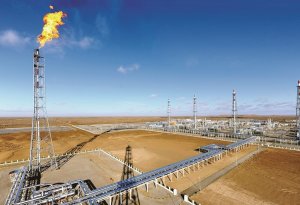China national oil and Gas Corporation (CNPC) and joint Stock company Uzbekneftegaz have started to prepare a project for the construction of the fourth line (line D) of the Central Asia – China gas pipeline, the raw material base of which is the deposits of Turkmenistan. It will pass through the territory of Surkhandarya region, connecting the gas infrastructure of Uzbekistan with the Tajik section of the new energy highway.
In Tajikistan, this project is carried out by the company "Trans-Tajik Gas Pipeline" — a joint venture between the CNPC and the joint-stock company "Tajiktransgas". Currently, the construction of the first object – a tunnel with a length of 1.56 km is being completed on the gas pipeline route in the Alai mountains. This year, it is planned to begin construction of four more tunnels.
As you know, Central Asia – China gas pipeline includes three parallel lines (A, B and C), running along the route Turkmenistan-Uzbekistan-Kazakhstan-China. The main volume of gas supplies to China – 35– 40 billion cubic meters per year – is provided by our country. Clean fuel is supplied to 25 provinces of China and Hong Kong special administrative region.
In turn, line D will be laid from the border of Turkmenistan through the territory of Uzbekistan, Tajikistan, and Kyrgyzstan. It is designed to supply gas to the southern and central part of the Xinjiang Uygur Autonomous Region of China. Its length is about 1000 km, the capacity is 30 billion cubic meters of gas per year. The total cost of the project is 6.7 billion us dollars.
In Tajikistan, a gas pipeline of more than 390 km will pass through the cities of Tursunzade and Gissar, Shakhrinav, Rudaki, Vakhdat, Faizabad, Nurabad, Rasht, Tajikabad and Lahsh. Given the mountainous terrain, this is the most difficult section of the highway, for the construction of which almost 9,5 thousand hectares of land have been allocated. Thus, along with the main objects of gas transport infrastructure, 42 tunnels with a total length of more than 63 km will be built here.
The gas pipeline route through the territory of Kyrgyzstan runs through the Alai and Chon-Alai districts of the Osh region. It is about 215 km. And here on the pipeline route there are many natural obstacles. In particular, you will need to implement the 13-crossing medium and large rivers. The project also includes 9 crane units, a compressor station, a gas metering station, a repair, and maintenance point, a shift camp and a control station in Bishkek. To date, the work on the allotment of land along the pipeline route has been completed.
In addition, last year Sino - Pipeline International Company Limited, which implements this project, sent 30 graduates of secondary schools of Kyrgyzstan to study at XI'an petrochemical University in specialties related to the operation of gas pipelines.
The governments of all countries participating in the project have repeatedly stated their interest in the construction of the fourth line of the Central Asia-China gas pipeline. Thus, in China, it is considered as another important step towards the diversification of natural gas imports, the demand for which is growing from year to year.
According to preliminary estimates, investments in the economy of Tajikistan associated with the construction of the gas pipeline will amount to more than $ 3 billion. At the same time, a modern gas transport infrastructure will be built, dozens of engineering, energy, transport facilities, three thousand jobs will be created. For 30 years of operation of the pipeline, Trans-Tajik Gas Pipeline plans to receive more than $ 15 billion for gas transit. Of these, about 4 billion dollars will go to the budget in the form of taxes and social contributions.
The project is economically beneficial for Kyrgyzstan. These are investments in gas transport infrastructure — about $ 1.2 billion, additional jobs for the population, as well as payments for gas transit and taxes — about $ 2.15 billion for 30 years. In addition, the government of Kyrgyzstan intends to hold additional negotiations with all the countries participating in the project on the possibility of selecting natural gas from the pipeline for gasification of the southern regions of the Republic.
We should add that in accordance with intergovernmental agreements after the fourth branch of the Central Asia-China gas pipeline is put into operation, natural gas supplies from Turkmenistan to China will increase to 65 billion cubic meters per year.













